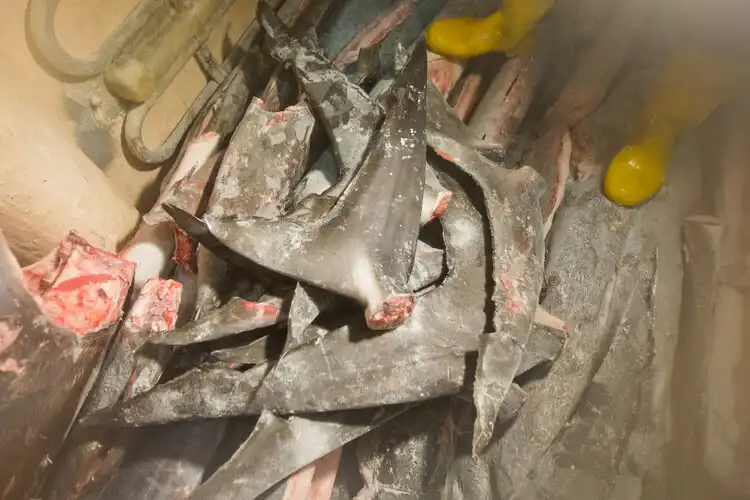
By DIVE Staff
A shocking new report by Greenpeace details forced labour, appalling conditions and persistent breaches of international agreements on shark fishing in Taiwan’s distant water fishing fleets – one of the largest in the world with more than a 1,000 vessels scouring the open ocean from the Pacific to the Atlantic.
‘Taiwan has been under international scrutiny for their fisheries practices and weak regulation after a series of exposés by Greenpeace East Asia and other organisations,’ said Pearl Chen, campaigner at Greenpeace East Asia. ‘Even though, under international pressure, the Taiwanese government amended relevant regulations, progress has not been enough. We found fresh evidence that both government and corporations are failing to protect and respect the human rights of migrant fishers in Taiwan’s distant water fishing fleet. In fact, according to reports from fishers, their conditions not only meet international definitions of forced labour, but could very well violate relevant Taiwanese regulations.’

Labour and human rights abuses continue to exist in Taiwan’s distant water fishing fleets, with one major global seafood trader found involved in shark finning, forced labour, and illegal transhipment.
According to the new Greenpeace East Asia investigation, migrant fishers, who worked onboard vessels that were either flagged or linked to Taiwan, reported conditions that constitute modern-day slavery. At least two vessels are linked to Fong Chun Formosa (FCF), which recently acquired US seafood company Bumble Bee.
In ‘Choppy Waters – Forced Labour and Illegal Fishing in Taiwan’s Distant Water Fisheries’, Greenpeace East Asia visited one of the ports most frequented by Taiwanese vessels and interviewed migrant fishers, all hired from Indonesia, who worked on fishing vessels flagged or otherwise linked to Taiwan; as well as analysed the fishers’ contracts and salary slips. Furthermore, the automatic identification system (AIS) of vessels, where available, were studied to identify ports at which the vessels docked, and potential transhipment at sea behaviours.

In the interviews, the situations described met six of the eleven International Lanbour Organisation (ILO) indicators of forced labour including excessive overtime, withholding of wages, and retention of identity documents. One fisher, who worked on board Taiwanese ‘longliner A’ reported: ‘We only got to sleep for five hours if and when we caught some fish. If we didn’t catch anything, we’d just have to keep working, even for 34 hours straight.’
Fishers also provided accounts of shark finning and illegal transfer of crew and shark fins between vessels. According to one fisher: ‘We only kept the fins of the sharks and discarded the rest of their meat. Last month, I placed the fins out under the sun to dry, but a few days later, we spotted an American patrol boat. The captain got really scared and told me to hide all the fins so that the Americans wouldn’t find them.’
Illegal, unreported and unregulated (IUU) fishing practices were also described by the migrant fishers on at least two vessels confirmed to be supplying to FCF. This suggests fish tainted with IUU fishing and forced labour may be getting into the consumer market.

‘Consumers in the main fish markets have every reason for concern that the seafood they buy may have been caught illegally, mixed with illegal catches or fished by workers subject to poor working conditions and even forced labour,’ said Pearl Chen. ‘The cases of human rights abuse and environmental destruction we found are simply shocking, and major seafood corporations, like FCF, need to lead and uphold global fishery reform.’
FCF has been ranked as one of the world’s top three tuna traders with strong market links in Japan, the Americas, and Europe. In January this year, FCF won court approval to acquire bankrupt American seafood company Bumble Bee Foods. Court documents from 2019 have shown that FCF has been supplying Bumble Bee with over 95 per cent of the albacore and over 70 per cent of light meat tuna they sell.


